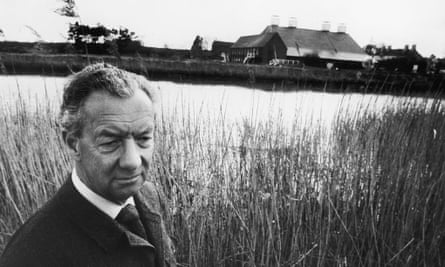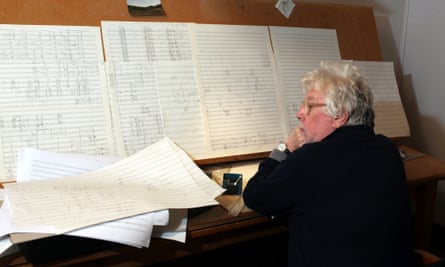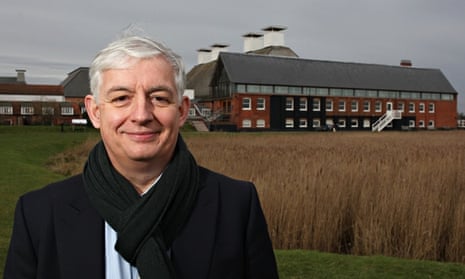When Roger Wright announced last March that he would be standing down as controller of BBC Radio 3 and the Proms to take over the running of the Aldeburgh festival there was a flurry of excited speculation as to the reasons behind his move: was it a snub to BBC director general Tony Hall who had just reiterated the organisation’s commitment to the arts? Was he jumping before budget cuts and the possible loss of an orchestra? Had he been overlooked for an internal promotion?
“An awful lot was predicated on people saying it was a precipitous move,” says Wright. “But I had been there longer than any other service controller in BBC history. So what exactly was the hasty bit? The main reason was that I was offered a fascinating challenge and it was something I thought I wanted to do. But, to Aldeburgh’s huge credit, my appointment had been kept a secret for some months, and so the rumour mill hadn’t been warmed up and it appeared to be a shock announcement, which was complete nonsense.”
He says he had been approached about many jobs while at the BBC, but hadn’t been looking to leave and thought he might do another few years and then retire. “But when Aldeburgh popped up I was intrigued, and the more I thought about it, the more attractive it seemed. An organisation that works with excellence, is committed to developing audiences and developing young artists, all in the most fabulous location and with one of the most amazing concert halls in the world: what’s not to like?”
The programme for Wright’s first festival as chief executive, working with artistic director Pierre-Laurent Aimard, has just been announced. “You could sum it up as anyone with a name beginning with ‘B’,” he says. The festival will open in June with a double bill of Harrison Birtwistle chamber operas including the world premiere of a new work, The Cure. “We are also celebrating Pierre Boulez at 90. Our artist in residence is George Benjamin. And of course there is that man called Britten.”
After the festival’s Britten centenary celebrations in 2013, Wright says there is now an opportunity to look ahead for an organisation that has been successful at evolving while “at the same time ensuring that something of the original vision still runs through it all. The building of the Maltings concert hall in 1967, two decades after the first festival, was a big moment. Its rebuilding after the fire in 1969 was another staging post. The creation of the young-artist school in 1972 was in itself groundbreaking. We think now that young-artist programmes are two a penny, but at the time they were very new. Fast forward to 2009 and the Hoffmann building and the Britten studio. And amid the changes there are some lovely pieces of continuity such as Birtwistle’s first opera, Punch and Judy, premiering at Aldeburgh in 1968, although one gathers that Britten didn’t much enjoy it.”

Wright sees one of his primary tasks as maintaining the balance between the charms of the local and the demands of the international. “This is a festival whose roots are deep within the community, but also has international standing. And it is simultaneously closed and open. People like things to be black and white, but there is valuable nuance and subtlety in being both open and closed. Part of the magic of Aldeburgh comes from the closed world of Britten and his circle, which has been well documented and which needed to be closed to protect him as someone in the public eye. But at the same time, here was this very public thing, the festival, that wanted to engage the local community and to be part of the wider world. So you still want it to be a privileged place for artists to work in, but something also for as many people as possible to share. You want music to be a natural part of everyday life, not just something that goes on in the concert hall.”
Wright was born in 1956 in Manchester, a city he describes as “naturally musical”. Not just for Chetham’s school, he says, where he was a pupil when it became a specialist music academy, “and not just for the Hallé, the BBC Northern Orchestra or even institutions such as the Henry Watson music library, a publicly accessible major collection free at point of use. But all of those things together made it a fantastic place in which to be interested in music. And of course there was also Lancashire County Cricket Club, my other great passion.”
He was a choirboy in the parish church where his father was the rector – he also played the piano “quite well”, then the cello “very poorly”. But he was good enough to study music at Royal Holloway College, after which he assumed he would become a music teacher. However, a sabbatical year as president of the student union provided him with administrative and leadership skills and, in 1978, Wright took up a post as librarian, eventually rising to become director at the British Music Information Centre (BMIC), the repository of the largest collection of 20th-century British musical scores and recordings.
“I had used the centre as an undergraduate and was like a child in a candy store,” he says. “It felt at the centre of things, because publishers and festival planners and composers would be coming in all the time. There was a sense of it being a hub.”
Wright found himself dealing with the experimental fringes of contemporary British music as well as more mainstream work and says he long ago gave up trying to reconcile “these two seemingly incompatible aspects of my taste: the music of Stanford, Parry and Howells alongside that of Birtwistle, Goehr, Maxwell Davies and so on. These two worlds shouldn’t really sit together, but they do.”
His eclectic tastes were formed at Chetham’s where a teacher would “occasionally slip me a score that wasn’t on the syllabus but that he thought I might be interested in: the Penderecki Threnody for the Victims of Hiroshima, Britten’s War Requiem, Berg’s Chamber Concerto. It was very clever, because without really realising what was happening, a world was being opened up to me that was not labelled as ‘difficult’ music and that I could respond to quite naturally.”

He says it is dispiriting how many people “who are otherwise perfectly comfortable in the worlds of art and culture and happy to say what they think of the latest book or film or exhibition, have a nervousness if you ask them what a concert was like. They think they need some sort of specialist knowledge to comment. How has that happened? Is it to do with language? If you speak about the moods or emotions music evokes are you not taking it seriously enough? I would feel incredibly sad and a bit hamstrung not to be able to express an opinion about an art exhibition, and it is equally sad that people are wary of expressing their responses to music. We seem to have lost a popular discourse around this.”
One way in which the Aldeburgh festival has been successful in tackling this problem, Wright says, is by offering “what is called difficult music along with a permission to enjoy it, question it and discuss it as a natural part of what we do. We have an audience that trusts us and will come to something such as the Lachenmann string quartets knowing that they are free to find a way in. The same is true for the BBC at its best.”
Wright first joined the BBC in 1987 as a senior producer for the BBC Symphony Orchestra. “By this time I’d done quite a lot of writing and reviewing as well as bits of radio and television and so I’d seen the BBC as a freelancer. But now I was flung into the world of professional orchestras and I loved it. Assisting great artists, and composers, to give of their best has been one of the great privileges of my life ever since.”
Within two years he had become the artistic administrator of the Cleveland Orchestra in the US and, in 1992, he moved again, to Hamburg, where he managed artistic planning and production for record company Deutsche Grammophon. “At the time there was an optimistic sense of trying to find the next Three Tenors, but in hindsight these were in fact the last years of the CD boom.”
He returned to the BBC in 1997 as head of classical music, becoming controller of Radio 3 a year later before adding the Proms to his portfolio in 2007. “From my first spell there, I got a sense of the unique work the BBC does and the editorial freedom you have – something different from ignoring your audience – to think first about who and what are the most important people or pieces to build a programme around, and to delve into some of the byways and highways.”
When he returned after 10 years abroad, commercial classical music stations had arrived and “the BBC, and world, were different places. I didn’t have a fixed agenda. You have to work with what you find. You can’t go in with a set script. Of course I hope that over the years I have developed certain management and analytical and strategic skills. But you can have all the strategic documents and PowerPoints you like, in the end all the organisations I have worked with are defined by what they have done. That is what matters.”
Wright soon attracted the ire of some parts of the audience for broadcasting more jazz and world music in the new show Late Junction. “That grew out of a realisation that audiences weren’t sticking to their little boxes any more. If you like classical music you might also like other music and there are lots of people who are quite comfortable with a new Hildegard of Bingen disc, a new Zappa disc, a Chopin nocturne and Morton Feldman. And after just a few weeks, Late Junction seemed like an old friend. And that comes from trusting the brand.”
He says both the BBC and Aldeburgh have earned the right to take listeners by the hand. “And I love inviting an audience into new places and challenging lazy thinking. Every year when the Proms programme came out people would complain about us doing, say, Parry’s Fifth Symphony. And then you’d ask them when they last heard it and they’d say they had never heard it. So let’s take the opportunity to put on the best possible performance of it and let people judge. Present it with a certain confidence, but don’t overclaim: it’s probably not the best piece ever, but nor is it the worst. What you are doing is filling in the landscape so that when you then look at the truly great works, your appreciation is made that little bit more rich and deep.”
Balancing the competing expectations of Radio 3 – the constant background noise is of simultaneous accusations of chasing audiences by dumbing down, and ignoring what people want by being elitist – was never going to be easy. Now he has left, he is not going to become one of those “tired voices railing against the organisation that built their careers. It is utterly hypocritical and you become diminished by becoming a person who expects the world to revolve around you. The world is more interesting and subtle than that. And there are much bigger things at stake. When I left Cleveland I didn’t stop caring about it. When I left DG I didn’t cease to be interested in the recording industry. It’s the same with the BBC.”
When the Aldeburgh announcement was made, a friend of his said he was completing the circle: Britten and Aldeburgh had been important parts of the British music scene when Wright took his first job at the BMIC. “It is a neat observation,” he says, “but in reality it has not been in the slightest a planned career. It sounds cheesy, but kind people have asked me to do wonderful jobs. And within that there are many links, and whether it was at Cleveland or Hamburg or the BBC or Aldeburgh, when you are dealing with music, and musicians, of the quality that I have been lucky enough to work with, you soon learn that the local, the regional, national and international are all essentially part of the same thing.”

Comments (…)
Sign in or create your Guardian account to join the discussion